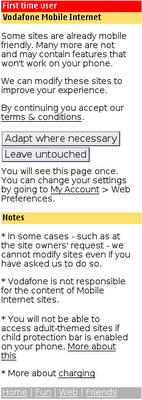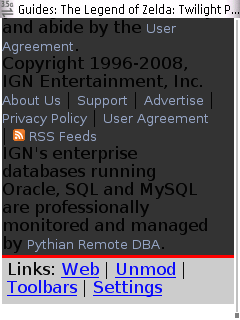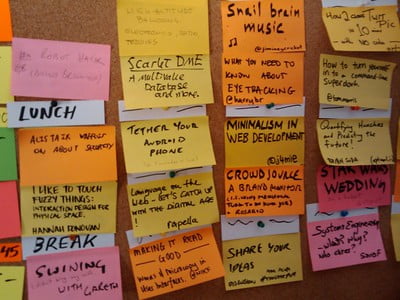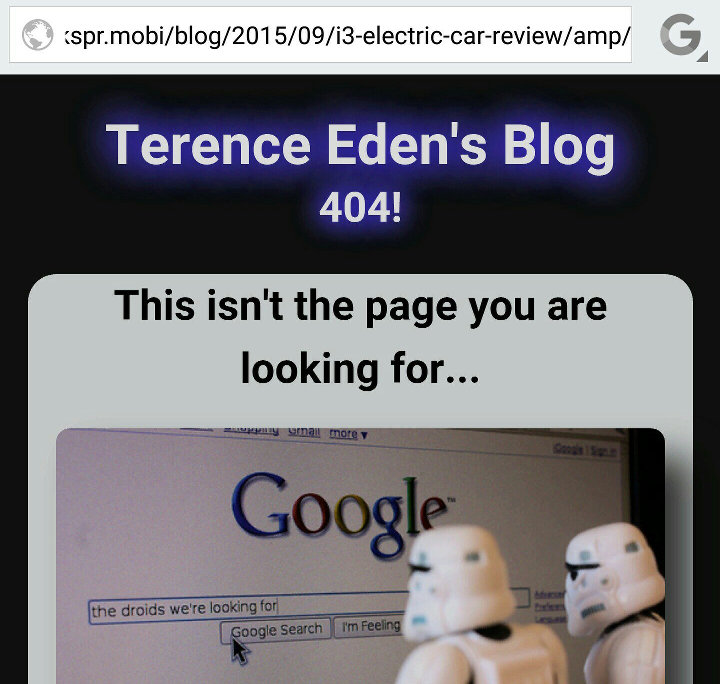Transcoding - personal thoughts
There's been a lot of talk over the last year about web-mobile transcoding proxies and all the pitfalls (and pratfalls) that go with them. Last year at mobileCampLondon I gave a talk to people interested in the subject. At various industry events people come up to me to talk about the issue.
Recently, this topic has been reignited with an interview with Jayanthi Rangarajan in Mobile Marketing Magazine - so I thought I would share my thoughts and opinions.
I was partly involved with the launch of transcoding in the UK - this blog is not an official Vodafone comment. This is just me giving my opinion.
One thing that consistently crops up is the myth that users are given no control over their transcoding experience. This is, simply put, not true.
The first time that a (Vodafone UK) user attempts to visit a regular web page, they are presented with the following screen.
 They can choose whether or not to adapt pages. When they are on an adapted page, they can choose to see the unmodified page.
They can choose whether or not to adapt pages. When they are on an adapted page, they can choose to see the unmodified page.

They can - at any time - change their preferences.

I think that's fairly standard across most operators.
So, onto the meat of the issue...
It's my opinion that transcoding is needed - in some cases. There are far too many sites out there which don't work adequately with mobile browsers and don't provide a mobile version. Webmasters need to create standards compliant code. Until every mobile browser passes the Acid2 test and every webmaster's pages validate we need transcoding proxies.
It's my opinion that browsing a full-fat website on a tiny screen while using a GPRS connection is painful. As much as I'd like everyone to go out and buy an N95 and move to an area with HSDPA coverage, that's not going to happen. We need a way to make web browsing pleasant for those who don't want to upgrade their phone or move house.
It's my opinion that when a user requests a page, they should get that page. If I visit the Wall Street Journal - that's the page I want. I didn't request the mobile version. But this still leaves the issue of webmasters informing their readers what versions are available and letting them make that choice.
It's my opinion that the original user agent should be sent. But this still leaves us with the tricky problem of what to do when a site turns round and says "You must use Internet Explorer 5.0 or better to view this site".
It's my opinion that proxies shouldn't transcode mobile content. But what should they do if they see a .com site serving a page with a mime type of HTML and with a doctype of HTML4? How is it to know that the content is already mobile friendly in that case?
It's my opinion that most customers like transcoding. It costs money to run a transcoding service. It costs a company money every time someone rings or writes in to complain. If the cost of dealing with complaints exceeds the profit from what they're complaining about, that service won't be around much longer. I can't reveal how many customers transcode - but as the service is still being provided, it's fairly obvious that people are using it and not complaining in great volume. Other operators are launching transcoding because the majority of customers find it useful and it enhances their revenue.
It's my opinion that the way transcoding was rolled out in Vodafone UK (and other markets) was fairly insensitive to the needs of the industry. But with the lack of best practice guidelines and any widely attended industry bodies it's hard to have the foresight to make all the right choices. It's great that the W3C has come up with a best practice guide.
It's my opinion that some (not all) mobile content producers are worried that their market share will decline because people can now visit their favourite web sites rather than being restricted to specially crafted mobile sites. That's a problem faced by networks as well - why subscribe to an operator's news service when you can visit the BBC News?
It's my opinion that operators and transcoders need to work more closely with the community. There's been too much stomping around by the operators when they should have been consulting and informing. It's great that sites like betavine.net provide a forum where we can discuss our issues. I only wish it had been proactive rather than reactive.
Finally, it's my opinion that we're all civilised adults. There's no need for spiteful name calling, threatening remarks or otherwise abusive behaviour. Not only is it nasty and upsetting for some of those on the receiving end - it's also unprofessional and hurts your cause. People aren't robots - they act emotionally. When they're on the receiving end of sustained vitriolic attacks, they're not very likely to turn round and say "You know, I'm deeply offended by what you implied about my parentage, but I'm going to make the changes you're demanding anyway".
In a perfect world, we wouldn't need transcoding because all sites would use CSS and XHTML to their best advantage. We wouldn't need WURFL or DeviceAtlas because devices would broadcast their specifications and gracefully deal with content they couldn't handle. We wouldn't need to fuss around with whitelists and blacklists because mobile friendly sites would unequivocally show that they were mobile friendly. We'd all be consulted every time an operator wanted to make a change to their network that impacted us.
The only way we get to live in a perfect world is if we build it ourselves.
Remember, these are my personal thoughts. I welcome all polite discussion.




What links here from around this blog?